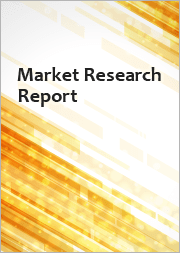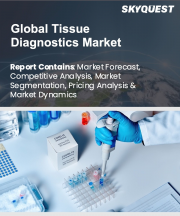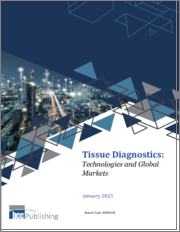
|
시장보고서
상품코드
1660696
조직 진단 시장 보고서 : 제품 유형별, 기술별, 질환별, 최종사용자별, 지역별(2025-2033년)Tissue Diagnostics Market Report by Product Type, Technology, Disease, End-User, and Region 2025-2033 |
||||||
조직 진단 세계 시장 규모는 2024년 58억 달러에 달했습니다. 향후 IMARC Group은 2033년에는 98억 달러에 달할 것으로 예상하며, 2025-2033년 연평균 성장률(CAGR)은 5.64%에 달할 것으로 예측하고 있습니다.
조직 진단은 질병의 생물학적 배경을 파악하기 위해 특정 조직 샘플을 분석하고 검사하는 것을 포함합니다. 암이나 염증성 질환과 같은 특정 질환을 감지하는 데 사용되며, 악성 종양의 정확한 종류와 정도를 파악하여 잠재적인 원인과 치료법을 파악하는 데 도움이 됩니다. 조직 진단은 매우 정확하고 저렴하며, 코어 생검이나 개복 생검 등 다양한 방법으로 시행할 수 있습니다. 최근에는 면역조직화학(IHC), in situ hybridization(ISH), 디지털 병리학, 특수염색 등의 첨단 기술도 진단에 활용되고 있습니다.
출산율 감소와 평균 수명의 증가로 인해 전 세계적으로 노인 인구의 비율이 꾸준히 증가하고 있습니다. 노인은 만성질환에 걸리기 쉽기 때문에 잦은 검사와 진단이 필요합니다. 이 외에도 식습관의 변화, 알코올 섭취 증가, 신체 활동 감소 등으로 인해 일부 생활습관병의 발생률이 증가하고 있습니다. 이와 더불어 모든 연령대에서 다양한 종류의 암의 유병률이 증가하고 있는 것도 이러한 진단 서비스에 대한 수요의 급증으로 이어지고 있습니다.
본 보고서에서 다루는 주요 질문
- 전 세계 조직 진단 시장 규모는?
- 2025-2033년 세계 조직 진단 시장의 예상 성장률은?
- 세계 조직 진단 시장을 이끄는 주요 요인은 무엇인가?
- COVID-19가 세계 조직 진단 시장에 미치는 영향은?
- 세계 조직 진단 시장의 제품 유형별 시장 현황은?
- 전 세계 조직 진단 시장의 기술별 시장 현황은?
- 전 세계 조직 진단 시장의 질환별 시장 현황은?
- 세계 조직 진단 시장의 최종사용자별 시장 현황은?
- 세계 조직 진단 시장의 주요 지역은?
- 세계 조직 진단 시장의 주요 플레이어/기업은?
목차
제1장 서문
제2장 조사 범위와 조사 방법
- 조사 목적
- 이해관계자
- 데이터 소스
- 1차 정보
- 2차 정보
- 시장 추정
- 상향식 접근
- 하향식 접근
- 조사 방법
제3장 주요 요약
제4장 소개
- 개요
- 주요 업계 동향
제5장 세계의 조직 진단 시장
- 시장 개요
- 시장 실적
- COVID-19의 영향
- 시장 내역 : 제품 유형별
- 시장 내역 : 기술별
- 시장 내역 : 질환별
- 시장 내역 : 최종사용자별
- 시장 내역 : 지역별
- 시장 예측
제6장 시장 내역 : 제품 유형별
- 기기
- 시장 동향
- 시장 예측
- 소모품
- 시장 동향
- 시장 예측
제7장 시장 내역 : 기술별
- 면역조직화학
- 시장 동향
- 시장 예측
- ISH(In Situ Hybridization)
- 시장 동향
- 시장 예측
- 디지털 병리학과 워크플로우 관리
- 시장 동향
- 시장 예측
- 특수 염색
- 시장 동향
- 시장 예측
제8장 시장 내역 : 질환별
- 유방암
- 시장 동향
- 시장 예측
- 위암
- 시장 동향
- 시장 예측
- 림프종
- 시장 동향
- 시장 예측
- 전립선암
- 시장 동향
- 시장 예측
- 비소세포폐암
- 시장 동향
- 시장 예측
- 기타
- 시장 동향
- 시장 예측
제9장 시장 내역 : 최종사용자별
- 병원
- 시장 동향
- 시장 예측
- 연구소
- 시장 동향
- 시장 예측
- 제약회사
- 시장 동향
- 시장 예측
- 수탁연구기관
- 시장 동향
- 시장 예측
- 기타
- 시장 동향
- 시장 예측
제10장 시장 내역 : 지역별
- 북미
- 시장 동향
- 시장 예측
- 유럽
- 시장 동향
- 시장 예측
- 아시아태평양
- 시장 동향
- 시장 예측
- 중동 및 아프리카
- 시장 동향
- 시장 예측
- 라틴아메리카
- 시장 동향
- 시장 예측
제11장 SWOT 분석
- 개요
- 강점
- 약점
- 기회
- 위협
제12장 밸류체인 분석
제13장 Porter's Five Forces 분석
- 개요
- 구매자의 교섭력
- 공급 기업의 교섭력
- 경쟁 정도
- 신규 참여업체의 위협
- 대체품의 위협
제14장 가격 분석
- 가격 지표
- 가격 구조
- 마진 분석
제15장 경쟁 구도
- 시장 구조
- 주요 기업
- 주요 기업 개요
- Roche
- Danaher
- Thermo Fisher Scientific
- Abbott
- Agilent Technologies
- Merck
- Sakura Finetek Japan
- Abcam
- BD
- Qiagen
- Bio SB
- Biogenex
- Cell Signaling Technology
The global tissue diagnostics market size reached USD 5.8 Billion in 2024. Looking forward, IMARC Group expects the market to reach USD 9.8 Billion by 2033, exhibiting a growth rate (CAGR) of 5.64% during 2025-2033.
Tissue diagnostics include the analysis and testing of specific tissue samples by capturing the biological context of diseases. They are used to detect certain medical conditions like cancer and inflammatory disorders and reveal the exact type and degree of malignancy which assists in identifying potential causes and treatment options. Tissue diagnostics are highly accurate, inexpensive and can be carried out by different techniques like core and open biopsy. Nowadays, advanced technologies like immunohistochemistry (IHC), in situ hybridization (ISH), digital pathology and special staining are also being employed for performing these diagnoses.
Owing to the declining fertility rates and increased life expectancy, the overall share of the geriatric population is currently experiencing steady growth worldwide. This is a crucial factor contributing to the market growth as older adults are more susceptible to chronic diseases and thus require frequent check-ups and diagnoses. Apart from this, altering food patterns, rising alcohol consumption and reduced physical activities among individuals have led to a rise in the incidences of several lifestyle diseases. In addition to this, the rising prevalence of various types of cancers among all age groups has also led to a surge in demand for these diagnostic services.
Key Market Segmentation:
Breakup by Product Type:
- Instruments
- Consumables
Breakup by Technology:
- Immunohistochemistry
- In Situ Hybridization
- Digital Pathology and Workflow Management
- Special Staining
Breakup by Disease:
- Breast Cancer
- Gastric Cancer
- Lymphoma
- Prostate Cancer
- Non-Small Cell Lung Cancer
- Others
Breakup by End-User:
- Hospitals
- Research Laboratories
- Pharmaceutical Companies
- Contract Research Organizations
- Others
Breakup by Region:
- North America
- Europe
- Asia Pacific
- Middle East and Africa
- Latin America
Competitive Landscape:
The report has also analysed the competitive landscape of the market with some of the key players being Roche, Danaher, Thermo Fisher Scientific, Abbott, Agilent Technologies, Merck, Sakura Finetek Japan, Abcam, BD, Qiagen, Bio SB, Biogenex, Cell Signaling Technology, etc
Key Questions Answered in This Report
- 1.How big is the global tissue diagnostics market?
- 2.What is the expected growth rate of the global tissue diagnostics market during 2025-2033?
- 3.What are the key factors driving the global tissue diagnostics market?
- 4.What has been the impact of COVID-19 on the global tissue diagnostics market?
- 5.What is the breakup of the global tissue diagnostics market based on the product type?
- 6.What is the breakup of the global tissue diagnostics market based on the technology?
- 7.What is the breakup of the global tissue diagnostics market based on the disease?
- 8.What is the breakup of the global tissue diagnostics market based on the end-user?
- 9.What are the key regions in the global tissue diagnostics market?
- 10.Who are the key players/companies in the global tissue diagnostics market?
Table of Contents
1 Preface
2 Scope and Methodology
- 2.1 Objectives of the Study
- 2.2 Stakeholders
- 2.3 Data Sources
- 2.3.1 Primary Sources
- 2.3.2 Secondary Sources
- 2.4 Market Estimation
- 2.4.1 Bottom-Up Approach
- 2.4.2 Top-Down Approach
- 2.5 Forecasting Methodology
3 Executive Summary
4 Introduction
- 4.1 Overview
- 4.2 Key Industry Trends
5 Global Tissue Diagnostics Market
- 5.1 Market Overview
- 5.2 Market Performance
- 5.3 Impact of COVID-19
- 5.4 Market Breakup by Product Type
- 5.5 Market Breakup by Technology
- 5.6 Market Breakup by Disease
- 5.7 Market Breakup by End-User
- 5.8 Market Breakup by Region
- 5.9 Market Forecast
6 Market Breakup by Product Type
- 6.1 Instruments
- 6.1.1 Market Trends
- 6.1.2 Market Forecast
- 6.2 Consumables
- 6.2.1 Market Trends
- 6.2.2 Market Forecast
7 Market Breakup by Technology
- 7.1 Immunohistochemistry
- 7.1.1 Market Trends
- 7.1.2 Market Forecast
- 7.2 In Situ Hybridization
- 7.2.1 Market Trends
- 7.2.2 Market Forecast
- 7.3 Digital Pathology and Workflow Management
- 7.3.1 Market Trends
- 7.3.2 Market Forecast
- 7.4 Special Staining
- 7.4.1 Market Trends
- 7.4.2 Market Forecast
8 Market Breakup by Disease
- 8.1 Breast Cancer
- 8.1.1 Market Trends
- 8.1.2 Market Forecast
- 8.2 Gastric Cancer
- 8.2.1 Market Trends
- 8.2.2 Market Forecast
- 8.3 Lymphoma
- 8.3.1 Market Trends
- 8.3.2 Market Forecast
- 8.4 Prostate Cancer
- 8.4.1 Market Trends
- 8.4.2 Market Forecast
- 8.5 Non-Small Cell Lung Cancer
- 8.5.1 Market Trends
- 8.5.2 Market Forecast
- 8.6 Others
- 8.6.1 Market Trends
- 8.6.2 Market Forecast
9 Market Breakup by End-User
- 9.1 Hospitals
- 9.1.1 Market Trends
- 9.1.2 Market Forecast
- 9.2 Research Laboratories
- 9.2.1 Market Trends
- 9.2.2 Market Forecast
- 9.3 Pharmaceutical Companies
- 9.3.1 Market Trends
- 9.3.2 Market Forecast
- 9.4 Contract Research Organizations
- 9.4.1 Market Trends
- 9.4.2 Market Forecast
- 9.5 Others
- 9.5.1 Market Trends
- 9.5.2 Market Forecast
10 Market Breakup by Region
- 10.1 North America
- 10.1.1 Market Trends
- 10.1.2 Market Forecast
- 10.2 Europe
- 10.2.1 Market Trends
- 10.2.2 Market Forecast
- 10.3 Asia Pacific
- 10.3.1 Market Trends
- 10.3.2 Market Forecast
- 10.4 Middle East and Africa
- 10.4.1 Market Trends
- 10.4.2 Market Forecast
- 10.5 Latin America
- 10.5.1 Market Trends
- 10.5.2 Market Forecast
11 SWOT Analysis
- 11.1 Overview
- 11.2 Strengths
- 11.3 Weaknesses
- 11.4 Opportunities
- 11.5 Threats
12 Value Chain Analysis
13 Porters Five Forces Analysis
- 13.1 Overview
- 13.2 Bargaining Power of Buyers
- 13.3 Bargaining Power of Suppliers
- 13.4 Degree of Competition
- 13.5 Threat of New Entrants
- 13.6 Threat of Substitutes
14 Price Analysis
- 14.1 Price Indicators
- 14.2 Price Structure
- 14.3 Margin Analysis
15 Competitive Landscape
- 15.1 Market Structure
- 15.2 Key Players
- 15.3 Profiles of Key Players
- 15.3.1 Roche
- 15.3.2 Danaher
- 15.3.3 Thermo Fisher Scientific
- 15.3.4 Abbott
- 15.3.5 Agilent Technologies
- 15.3.6 Merck
- 15.3.7 Sakura Finetek Japan
- 15.3.8 Abcam
- 15.3.9 BD
- 15.3.10 Qiagen
- 15.3.11 Bio SB
- 15.3.12 Biogenex
- 15.3.13 Cell Signaling Technology



















